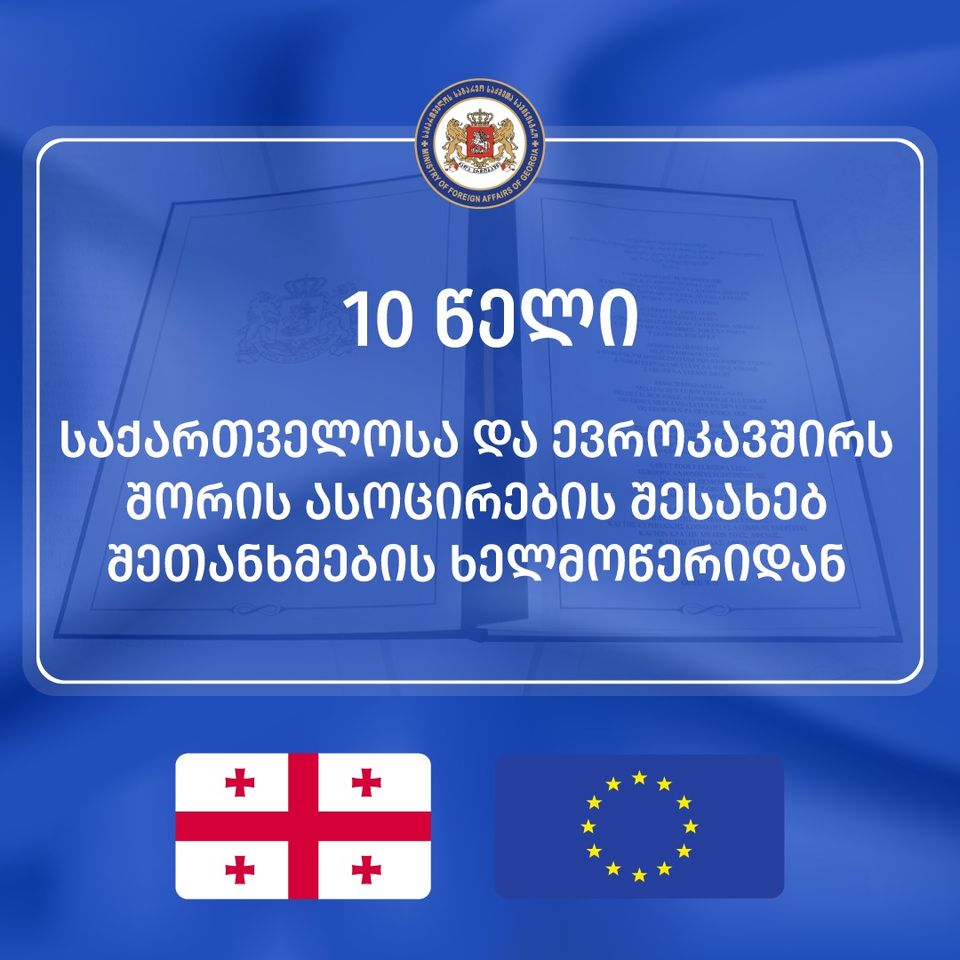Celebrating the 10th anniversary of the signing of the Association Agreement between Georgia and the European Union
• Today, we celebrate the 10th anniversary of the signing of the Association Agreement between Georgia and the European Union.
• On 27 June 2014, with the signing of the Association Agreement, Georgia-EU relations advanced to a qualitatively new stage. The Association Agreement serves as the main legal framework for Georgia-EU cooperation.
• This agreement outlines a detailed and well-timed plan for the EU's support of Georgia's democratic principles and reforms, fostering a free and competitive economy. It also includes Deep and Comprehensive Free Trade Area component (DCFTA).
• Following the signing of the Association Agreement, Georgia embarked on active efforts to meet the obligations specified in the Agreement. These efforts aim at the country's political association with the European Union, economic integration, and alignment with EU standards and norms across all areas and directions.
• Georgia has successfully implemented significant reforms outlined in the Association Agreement, notably aligning with EU standards both legislatively and institutionally, within the predetermined timeframes. To date, Georgia has fulfilled 55% of the Association Agreement's obligations and 65% of the Deep and Comprehensive Free Trade Area (DCFTA) component.
As a result of these reforms:
The opening of the EU market of 450 million consumers to Georgian products provided a significant boost to trade and economic relations, leading to increased exports of Georgian products.
Georgian citizens gained visa-free travel access to EU/Schengen member states.
Important reforms were implemented across various sectors including democracy and human rights, public administration, public procurement, financial control, education quality enhancement, employment promotion, labor rights protection, environmental protection, food safety standards enforcement, consumer rights protection, and modernization of customs and tax systems.
Georgia received several million euros in financial assistance from the EU, supporting development in agriculture, manufacturing, education, culture, science, innovation, and other key sectors.
Signing the Association Agreement provided momentum for Georgia's participation in EU framework programs such as ERASMUS+, Horizon 2020, and Creative Europe. It also enhanced cooperation with European agencies including FRONTEX, EUROPOL, EUROJUST, and others.
Georgia ranks 6th among 141 partner countries participating in the ERASMUS program in terms of the number of mobilities.
The Association Agreement has bolstered cooperation between Georgia and the European Union in the realm of culture, facilitating the presentation and promotion of Georgian cultural heritage across EU member states.
The Association Agreement has significantly enhanced Georgia's investment climate. Investors are granted the advantage of exporting their products to the EU market tariff-free when manufacturing within Georgia's borders, thereby encouraging foreign investment and local production.
• In parallel with the Association Agreement, Georgia has elevated its cooperation with the European Union to a significantly higher level. Following the decision of the European Council on December 14, 2023, Georgia was granted candidate status, marking its transition into a country actively pursuing membership in the European Union.
• At this stage, Georgia is actively engaged in fulfilling the necessary obligations to initiate negotiations for EU accession. This commitment underscores Georgia's dedication to advancing its integration process with the European Union, while simultaneously continuing the successful implementation of the association agreement.
